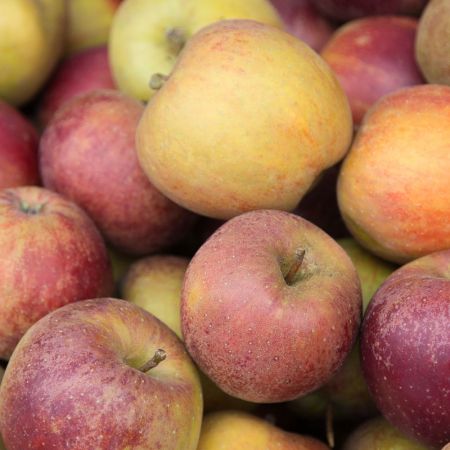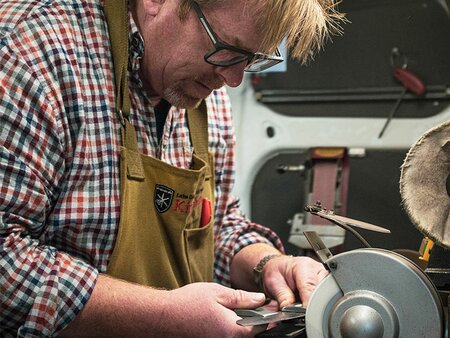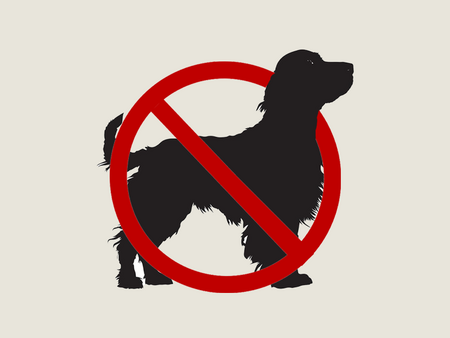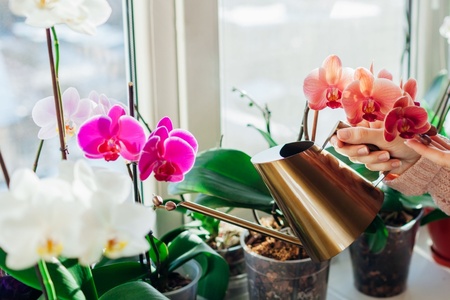
Your apple questions answered by expert Andy Gilchrist:
Apple Weekend may have been slightly different this year, but it was extremely enjoyable nonetheless and we loved welcoming you to Beetham Nurseries, to celebrate the nation's favourite fruit. One of the highlights of the weekend for us was the attendance of local Apple Expert Andy Gilchrist. We put your apple queries to Andy to answer...
Q: This year my apples were badly affected by pests like worms and snails etc... What should I do for better results next year?
A: Worms and snails don’t damage apples. There are many different pests which damage apples, each causes different types of damage. You need to describe the damage or better still bring in examples of damaged fruit for an accurate diagnosis of the problem. Only then can an appropriate solution be proposed.
Q: Should I feed or mulch my trees?
A: If you have a compost heap and wood ash from a wood fire or bonfire, you can spread compost and wood ash around the trees in late February/early March and this combination as a mulch will provide both nutrients for the trees and suppress weed growth. If you don’t have these ingredients the next best thing is “Blood Fish & Bonemeal” which is a slow release fertiliser, and a dressing of this in early spring will provide the nutrients but you’ll have to find another means to suppress the weeds, such as newspaper covered by bark chippings or stones.
Q: Can you recommend a smallish eating apple tree which is self fertilising and ideal for growing as cordons along wires?
A: All varieties except tip-bearers can be grown as cordons. The fact that you say “cordons” ie plural is puzzling. If you are growing more than one tree, then get at least two varieties so they will cross-pollinate and you don’t have to worry about a self-fertile variety. Also you always get better fruit set from cross-pollination than self-pollination. However if you really want to stick to just one variety, the following are claimed to be self-fertile : Greensleeves, Red Devil, Red Windsor, Saturn, Scrumptious, Ellison’s Orange, Falstaff, Sunset. When growing as cordons, choose MM106 as the rootstock.
Q: I have made three attempts to grow Cox’s Orange Pippin apple trees. Although the apples have been quite good, they are not the real thing. Has this variety joined the dinosaur, along with strong farm butter, high pheasant and other game, and the old English strawberry?
A: Over fifty years ago there was only one clone of Cox’s Orange Pippin and its fruit had up to 20% natural russet on it. As with any apple variety which is widely grown over a long period of time, “sports” arose which differed from the original by a single gene. Such single gene variations can affect the skin colour, the extent of russet, the time of picking, and the flavour. More people over the years bought their groceries in supermarkets and the supermarkets noticed that when people helped themselves to loose apples, they chose the less russeted apples and left the more heavily russeted fruit. So the supermarkets told their growers that they wanted Cox’s with less russet. Consequently when a new sport of Cox with less russet was found, the growers used this for their new orchards and it is possible that the sport with less russet might also have had a little less flavour. If I was a journalist I might stop here because it is a nice story which answers your question. However in life outside Fleet Street there are often a whole range of factors which muddy the water. For example, orchards over fifty years ago were composed on standard or half-standard trees on strong rootstocks whose roots went deep in the soil. Today’s orchards are grown as cordons on dwarfing rootstocks whose roots don’t go anywhere near as deep as those of half a century ago. It is widely accepted that the best wines come from old vines whose roots go deep so might it be the same cause and effect with apple trees? Finally, you’ve said you tried to grow the trees yourself – was that up here in Cumbria? Perhaps again, making another analogy with the vines, it may be a case of “terroire”, meaning the combination of your soil and local climate may not bring out as good a flavour as the Kentish/Sussex Weald. Incidentally, the “old English strawberry” you mention is a variety called Royal Sovereign. This has the best flavour of all strawberry varieties, but it was phased out fifty years ago by higher yielding varieties. Royal Sovereign is still available to grow at home, so purchase some plants and have a go, you will not regret it!
Q: What are these black spots I keep getting on my apples and what can I do about it?
A: The spots are caused by a fungus called apple scab which is very common because it is favoured up here by our damp climate. You can still eat the apples or use them for cooking because the flesh is not affected. Commercial growers apply fungicide sprays to prevent scab infection. This is also available to gardeners under the trade name “Bayer Fungus Fighter”. Whether you use this or not, you can reduce the disease pressure by breaking the life cycle of the fungus. It overwinters as spores on the leaves, so when the leaves have fallen around end October/early November, rake them up and dispose of them in your green bin, don’t put them on the compost heap. That means that when spring comes, you won’t have spores from beneath the tree infecting the new foliage. You may still get spores drifting in on the wind from neighbours near and far, but at least the infection pressure will have been reduced.
Q: My garden is in a very exposed situation, high up and windy. Can you recommend apple varieties which I can grow successfully in these conditions?
A: About 10% of all apple varieties are triploids meaning they have three sets of chromosomes and most of these are more vigorous than the other 90% which are diploids with two sets of chromosomes. These triploid varieties are more likely to thrive under difficult conditions. Examples are: Bramley, Ribston Pippin, Blenheim Orange, Belle de Boskoop, Gravenstein, Galloway Pippin, Orleans Reinette, Warner’s King, Scotch Bridget, Catshead, Lady Henniker, Ashmead’s Kernel, Jonagold, Jupiter & Holstein. However, the pollen from triploids is sterile so will not cross-pollinate any varieties. So you also need some diploid varieties because their pollen will cross-pollinate successfully. Examples of vigorous diploid varieties are: Greenups Pippin, Bradley’s Beauty, etc etc. The other point to be aware of under difficult conditions is to avoid dwarfing rootstocks and choose trees which are on vigorous rootstocks such as MM106 & MM111.
Q: How do I know when my apples are ready to pick?
A: Different varieties ripen at different times and those which open their blossoms the earliest do not neccesarily ripen the earliest. An apple is ripe when the pips go brown, but of course you have to pick an apple and slice or eat it to see the colour of the pips. An easy way to tell is to wait until the first ripe looking apple falls from the tree and check the colour of its pips. Then when you pick other apples from the tree, only pick those that come away easily when you twist the apple in your hand. If the apple resists a gentle pull and twist, it is probably not quite ripe. Don’t assume you should pick all the apples from the tree at the same time, commercial growers usually pick over a tree two or even three times to ensure the apples are picked in peak condition.
Q: My parents used to store apples by wrapping each one up in newspaper but then you have to unwrap some every now and then to make sure they are not going rotten or soft. Is there an easier way to store them?
A: Supermarkets display their apples in cardboard trays with “eggshell” inserts. Pick some of these up and put your apples in them, the inserts ensure they don’t touch each other. Also they are stackable which makes good use of space. Store them in an unheated room, attic or shed, ideally north-facing. But make sure there are no mice there and if necessary put down bait or traps.
We have a large range of fruit trees & bushes here in The Garden Centre, we look forward to welcoming you back to Beetham Nurseries very soon.



